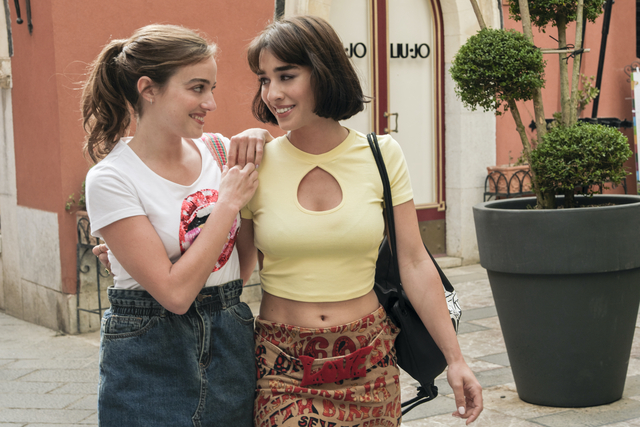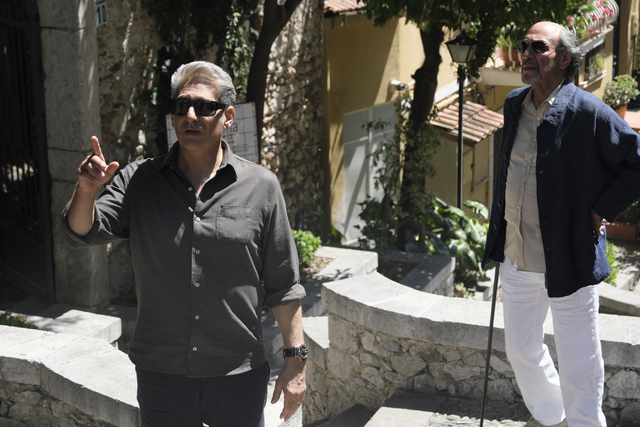Mike White knows he has a good thing going in The White Lotus. “I feel like I’ve cracked the code,” he recently told a reporter. “And I really don’t want to f-ck it up.” Originally intended as a miniseries, his COVID-optimized brainchild—a show about one-percenters losing their minds at a luxury resort—got renewed for a second season after becoming last year’s sleeper hit of the summer. Now, and especially since Lotus earned him an armful of awards at the Emmys in September, White gets to keep jetting off to gorgeous locations to satirize high society with help from some of the most talented casts on television. Who wouldn’t cling to a gig like that?
So maybe it’s out of an abundance of caution that White, who not only created the show, but also writes and directs every episode, opens the anthology series’ Sicily-set second season on such a familiar note. Airing Oct. 30 on HBO, the premiere begins with a flash-forward, a dead body, and a loaded interaction between tourists. “Italy’s just so romantic,” beautiful, perky Daphne (The Bold Type’s Meghann Fahy), whose time at this Lotus outpost is drawing to a close, enthuses to some new arrivals on the beach. “You’re gonna die. They’re gonna have to drag you outta here.” White soon takes us back to the beginning of Daphne’s week at the resort, as she and her cohort of Americans arrive via boat and are greeted at the dock by an army of uniformed staff. It’s an apt introduction to The White Lotus, Italian style—an upstairs, downstairs ensemble dramedy that feels a bit too eager to replicate the beats of its predecessor, but that nonetheless develops into an exquisitely agonizing snapshot of heterosexual romance as currently practiced.

The cast of characters is rich—and not just in the sense that they can afford a six-figure vacation. Daphne is accompanying her finance-bro husband, Cameron (Theo James), on an extended double date with his college roommate, Ethan (actor-writer-director Will Sharpe), and Ethan’s wife, Harper (Aubrey Plaza, playing against screwball type). Ethan has just sold his startup for a huge sum, and he and Harper, a lawyer who helps workers sue abusive companies, are experiencing obscene wealth for the first time in their 30s. He doesn’t seem to have any qualms with their new life, but for her, it’s surreal. She’s the type of person who loses sleep over “everything that’s going on in the world.” Cam and Daphne are the type of people who have no idea what she’s referring to when she says that.
Arriving in the same boatload as this foursome is a multigenerational clan of Sicilian-American men. Hollywood bigwig Dominic (Michael Imperioli) has brought his elderly father, Bert (F. Murray Abraham), and 20-something son, Albie (Adam DiMarco from The Magicians), to explore the roots of Bert’s side of the family. Dominic’s wife and daughter were supposed to come, too, before he did something that alienated them both. A phone conversation ends with his wife hollering at him as though possessed by Juno, the wrathful Roman goddess of marriage. Albie, who sees himself as a sensitive, pro-feminist Gen Z man and keeps reminding people that he went to Stanford, vows to do better than his dad and nonno, who hits on every woman he meets. “I refuse to have a bad relationship with women,” Albie declares.
So it’s with the utmost consideration that he starts to court Portia (Haley Lu Richardson), a depressive personal assistant who’s been instructed by her employer to make herself scarce. Happily for viewers but unfortunately for Portia, that boss happens to be the sole returning main character from season 1, Jennifer Coolidge’s raw, lonely, narcissistic heiress, Tanya. (Congratulations are in order: she’s now graduated—or, as she puts it, “worked [her] way up”—to the White Lotus’ ultra-VIP “blossom circle.”) For a woman whose sole occupation is drifting around the globe wallowing in her own feelings, an assistant is essentially an emotional support human. No wonder Tanya’s mysterious new husband, Greg (John Lies), who we watched her fall for in Hawaii, doesn’t want Portia coming between him and his histrionic bride.

In Lotus’ first season, which delved into inequalities wrought by class and colonialism, an overwhelmingly white cohort of guests thoughtlessly unloaded literal and emotional baggage on the resort’s Black and Indigenous staff, as a relatively privileged outsider—Murray Bartlett’s gay, Australian manager character—ran interference. When it comes to heterosexual love, of course, it’s women who remain, on balance, the oppressed underclass. So it makes sense that, in this bilingual season, they’re the local workers, excellently portrayed by a trio of Italian actors. Hotel manager Valentina (Sabrina Impacciatore) takes abuse from guests all day, only to have to fend off constant male attention on the street; no wonder she’s so prickly. But she abuses her power, too. She’s especially vicious to Lucia (Simona Tabasco) and Mia (Beatrice Grannò), two giggly best girlfriends dabbling in high-end sex work.
The same viewers who complained, last season, about White’s supposed failure to fully flesh out the show’s worker and Native Hawaiian characters might well raise the same objection to his depiction of these women. But I’ve never agreed with that well-intentioned reading. Lotus needs to devote more attention to its relatively empowered characters because—in life and on the show—they’re the ones whose decisions, made in the interest of comfort and enjoyment rather than survival, have the greatest repercussions on the people around them. What ties together not just these two seasons, but practically everything White has ever done (including his stints on Survivor), is an underlying suspicion that human civilization is a contradiction in terms.

This might be especially true within a capitalist society, though I’d wager that, given ample time for observation, he’d manage to find the fatal flaw in any conceivable economic or political system. Certainly, in Sicily, the pursuit of love under patriarchy proves to be just as toxic as the pursuit of money. White tackles the question of whether gender-typical behavior and the expectations we project on our love interests are innate or learned. And he wants to know if we can shed that baggage through sheer force of will. The initial outlook is bleak. Characters constantly say they want one thing and then do the opposite. Often, they’re fully aware that they’re setting themselves up to hurt someone or be hurt, yet they can’t resist their instincts.
White’s clear-eyed depiction of entrenched social structures is the black magic at the core of both Lotus seasons. Along with stunning performances (Imperioli and Abraham are particularly sharp together) and an attention to visual and aural detail that’s rare in character-driven TV (this season’s title sequence belongs in a museum), the show thrives on his perceptive writing. His dialogue packs layers of meaning into even the most banal statements, like Portia’s confession that “I’m just in a weird place,” which is true both mentally and physically, given her presence at this crucible of a resort. But he also excels on a macro scale. While same-gender romance falls mostly beyond the season’s scope, queerness asserts itself across story lines, as White cleverly explores the many ways in which it can be proximate to or even symbiotic with heterosexuality.
To the extent that it’s repurposing a successful template, The White Lotus isn’t quite as revelatory in its second season as it was in its first. Individual Sicily episodes, which again span a single day apiece, rarely achieve the same chaotic momentum as the ones set in Hawaii did. Yet the ideas are as fresh and provocative as ever. When it comes to characters and dialogue and humanism and thematic weight, the show can still hang with the best TV has to offer, from Better Things to Better Call Saul. Getting to vicariously luxuriate in White’s five-star vacation doesn’t hurt, either.
More Must-Reads From TIME
- The 100 Most Influential People of 2024
- The Revolution of Yulia Navalnaya
- 6 Compliments That Land Every Time
- What's the Deal With the Bitcoin Halving?
- If You're Dating Right Now , You're Brave: Column
- The AI That Could Heal a Divided Internet
- Fallout Is a Brilliant Model for the Future of Video Game Adaptations
- Want Weekly Recs on What to Watch, Read, and More? Sign Up for Worth Your Time
Contact us at letters@time.com